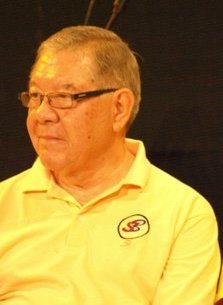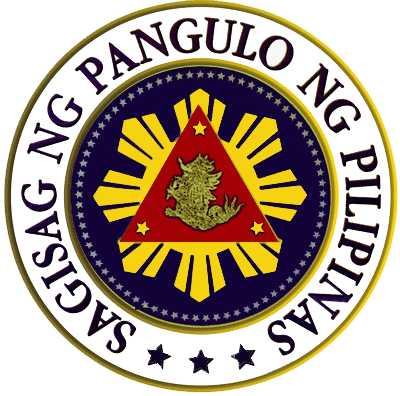|
1998 Philippine House Of Representatives Elections
Elections for the House of Representatives of the Philippines were held on May 11, 1998. Held on the same day as the presidential election, the party of the incumbent president, Fidel V. Ramos' Lakas-NUCD-UMDP, won majority of the seats in the House of Representatives. For the first time since the People Power Revolution, a party won majority of the seats in the House; Lakas had a seat over the majority. This is also the first Philippine elections that included the party-list system. However, with Joseph Estrada of the opposition Laban ng Makabayang Masang Pilipino (LAMMP; an electoral alliance between the Partido ng Masang Pilipino (PMP), the NPC and the Laban ng Demokratikong Pilipino (LDP)) winning the presidential election, the majority of the elected Lakas-NUCD-UMDP congressmen switched sides to LAMMP. This led to Manuel Villar, Jr. (formerly of Lakas but became a LAMMP member prior to the election) on being elected as the Speaker of the House. The elected representatives ... [...More Info...] [...Related Items...] OR: [Wikipedia] [Google] [Baidu] |
House Of Representatives Of The Philippines
The House of Representatives of the Philippines ( fil, Kapulungan ng mga Kinatawan ng Pilipinas, italic=unset, ''Kamara'' or ''Kamara de Representantes'' from the Spanish language, Spanish word ''cámara'', meaning "chamber") is the lower house of Congress of the Philippines, Congress, the bicameral legislature of the Philippines, with the Senate of the Philippines as the upper house. The lower house is usually called Congress, although the term collectively refers to both houses. Members of the House are officially styled as ''representative'' (''kinatawan'') and sometimes informally called ''congressmen'' or ''congresswomen'' (''mga kongresista'') and are elected to a three-year term. They can be re-elected, but cannot serve more than three consecutive terms except with an interruption of one term like the senate. Around eighty percent of congressmen are district representatives, representing a particular geographical area. The 19th Congress has 253 Congressional districts of ... [...More Info...] [...Related Items...] OR: [Wikipedia] [Google] [Baidu] |
1998 Philippine Presidential Election
The 1998 Philippine presidential and vice presidential elections were held on May 11, 1998. In the presidential election, Vice President Joseph Estrada won a six-year term as President by a landslide victory. In the vice-presidential race, Senator Gloria Macapagal Arroyo won a six-year term as Vice President, also by a landslide victory. This was the third election where both the president and vice president came from different parties. Background At the tail-end of the presidency of Fidel V. Ramos, several politicians have been jockeying for the nomination of his Lakas-NUCD-UMDP party. This included Speaker Jose de Venecia Jr., Defense Secretary Renato de Villa, and Cebu Governor Lito Osmeña. The Lakas nominee is widely expected to face Vice President Joseph Estrada, who had been leading candidate in the various opinion polls. Estrada had earlier declared in 1992 that he will not run for president, stating that he intends to retire when he reaches the age of 60 in 1998, b ... [...More Info...] [...Related Items...] OR: [Wikipedia] [Google] [Baidu] |
11th Congress Of The Philippines
The 11th Congress of the Philippines (Filipino: ''Ikalabing-isang Kongreso ng Pilipinas''), composed of the Philippine Senate and House of Representatives, met from July 27, 1998, until June 8, 2001, during the 31-month presidency of Joseph Estrada and the first four months of Gloria Macapagal Arroyo's presidency. The convening of the 11th Congress followed the 1998 national elections, which replaced half of the Senate membership, and the entire membership of the House of Representatives. The Estrada impeachment was the highlight of the 11th Congress. Sessions * First Regular Session: July 27, 1998 – June 4, 1999 ** ''First Special Session'': January 4 – February 5, 1999 * Second Regular Session: July 26, 1999 – June 9, 2000 ** ''Second Special Session'': January 3 – February 4, 2000 * Third Regular Session: July 24, 2000 – June 8, 2001 ** ''Third Special Session'': January 1 – February 16, 2001 Legislation Laws passed by the 11th Congress: Leadership Se ... [...More Info...] [...Related Items...] OR: [Wikipedia] [Google] [Baidu] |
Manuel Villar, Jr
Manuel may refer to: People * Manuel (name) * Manuel (Fawlty Towers), a fictional character from the sitcom ''Fawlty Towers'' * Charlie Manuel, manager of the Philadelphia Phillies * Manuel I Komnenos, emperor of the Byzantine Empire * Manuel I of Portugal, king of Portugal Places *Manuel, Valencia, a municipality in the province of Valencia, Spain *Manuel Junction, railway station near Falkirk, Scotland Other * Manuel (American horse), a thoroughbred racehorse * Manuel (Australian horse), a thoroughbred racehorse *Manuel and The Music of The Mountains, a musical ensemble *Manuel (album), ''Manuel'' (album), music album by Dalida, 1974 See also *Manny, a common nickname for those named Manuel {{disambiguation ... [...More Info...] [...Related Items...] OR: [Wikipedia] [Google] [Baidu] |
Laban Ng Demokratikong Pilipino
The Laban ng Demokratikong Pilipino () is a centre-right political party in the Philippines. There are no results available for the 2004 election for the House of Representatives, but according to the website of the House, the party held 7 out of 235 seats. The party is divided into two factions. The faction led by Edgardo Angara contested in the 2004 elections as a member party of the Koalisyon ng Nagkakaisang Pilipino (''Coalition of United Filipinos''). In the May 14, 2007 national elections, the party won 3 seats in the House of Representatives.See 2007 Philippine general election. History In the mid-1980s, the Partido Demokratiko Pilipino, Lakas ng Bayan (LABAN) and Lakas ng Bansa parties became members of the United Nationalist Democratic Organization (UNIDO) coalition that supported the candidacy of Corazon C. Aquino and Salvador H. Laurel for president and vice president, respectively in the February 7, 1986 snap election. By early 1986, PDP had merged with LABAN, f ... [...More Info...] [...Related Items...] OR: [Wikipedia] [Google] [Baidu] |
Nationalist People's Coalition
The Nationalist People's Coalition (NPC) is a conservative political party in the Philippines, founded in 1992 by then-presidential candidate Eduardo Cojuangco Jr. History The Party was founded in 1992 after some members of the Nacionalista Party led by then Rizal Governor Isidro Rodriguez bolted from the party after some disagreements with party leader and then-Vice President Salvador Laurel in preparation for the 1992 presidential elections. Members of the civil society including the business sector who called themselves "Friends of Danding" invited business tycoon Eduardo "Danding" Cojuangco, a former associate of the long-term authoritarian president Ferdinand Marcos, to run as president and Senator Joseph Estrada as vice president. Cojuangco lost the presidential race, finishing third while Estrada won the Vice Presidency by a landslide. [...More Info...] [...Related Items...] OR: [Wikipedia] [Google] [Baidu] |
Pwersa Ng Masang Pilipino
The Pwersa ng Masang Pilipino (), formerly ''Partido ng Masang Pilipino'' (), is a populist political party in the Philippines. It is the political party of former Philippine President Joseph E. Estrada. In the May 1998 presidential election, it aligned itself with other political parties to form the Laban ng Makabayang Masang Pilipino (Struggle of the Patriotic Filipino Masses). History Originally named the Partido ng Masang Pilipino, the Pwersa ng Masang Pilipino emanated from an organization which was an offshoot of the Economic Recovery Action Program (ERAP) organized by George S. Antonio in May 1990. The ERAP organization was formally launched on October 4, 1990 with 21 original members. The organization grew exponentially with the recruitment of members nationwide. It was then that the PMP was accredited as a political party with the objective of helping to uplift the lives of the Filipino people, especially the poor and the disadvantaged, through effective and efficien ... [...More Info...] [...Related Items...] OR: [Wikipedia] [Google] [Baidu] |
Laban Ng Makabayang Masang Pilipino
The Laban ng Makabayang Masang Pilipino () was the umbrella political coalition party of the opposition during the May 11, 1998 Philippine general election that led to the presidency of then-Vice President Joseph E. Estrada. It was the largest political party during that time, uniting the major Philippine political parties which included Senator Edgardo J. Angara's Laban ng Demokratikong Pilipino, business tycoon Eduardo M. Cojuangco Jr.'s Nationalist People's Coalition and Vice President Joseph E. Estrada's Partido ng Masang Pilipino, along with minor and regional parties. Estrada's running mate, Senator Edgardo Angara lost to fellow Senator Gloria Macapagal Arroyo of Lakas—NUCD—UMDP. Estrada won the presidency against then-Speaker of the House Jose C. de Venecia Jr. with a plurality margin of 6.4 million votes. Shortly after the 1998 elections, the party's name was changed into Lapian ng Masang Pilipino (Organization of the Filipino Masses), as the "struggle" end ... [...More Info...] [...Related Items...] OR: [Wikipedia] [Google] [Baidu] |
Joseph Estrada
Joseph Ejercito Estrada, (; born Jose Marcelo Ejercito; April 19, 1937), also known by the nickname Erap, is a Filipino politician and former actor. He served as the 13th president of the Philippines from 1998 to 2001, the 9th vice president of the Philippines from 1992 to 1998, and the 21st mayor of the City of Manila, the country's capital, from 2013 to 2019. In 2001, he became the first chief executive in Asia to be formally impeached and resigned from power. At the age of 85, he is currently the oldest living former Philippine President. Estrada gained popularity as a film actor, playing the lead role in over a hundred films in an acting career spanning some three decades. He also worked as a model, beginning as a fashion and ramp model at the age of 13. He used his popularity as an actor to make gains in politics, serving as mayor of San Juan from 1969 to 1986, as senator from 1987 to 1992, then as vice president under President Fidel V. Ramos from 1992 to 1998. Estr ... [...More Info...] [...Related Items...] OR: [Wikipedia] [Google] [Baidu] |
People Power Revolution
The People Power Revolution, also known as the EDSA Revolution or the February Revolution, was a series of popular Demonstration (people), demonstrations in the Philippines, mostly in Metro Manila, from February 22 to 25, 1986. There was a sustained campaign of civil resistance against regime violence and electoral fraud. The nonviolent revolution led to the departure of Ferdinand Marcos, the end of his 20-year dictatorship and the restoration of democracy in the Philippines. It is also referred to as the Yellow Revolution due to the presence of yellow ribbons during demonstrations (in reference to the Tony Orlando and Dawn song "Tie a Yellow Ribbon Round the Ole Oak Tree") as a symbol of protest following the Assassination of Benigno Aquino Jr., assassination of Filipino senator Benigno "Ninoy" Aquino, Jr. in August 1983 upon his return to the Philippines from exile. It was widely seen as a victory of the people against two decades of presidential rule by President Marcos, ... [...More Info...] [...Related Items...] OR: [Wikipedia] [Google] [Baidu] |
Fidel V
{{disambiguation ...
Fidel most commonly refers to: * Fidel Castro (1926–2016), Cuban communist revolutionary and politician * Fidel Ramos (1928–2022), Filipino politician and former president Fidel may also refer to: Other persons * Fidel (given name) Film * ''Fidel'' (2002 film), a 2002 mini-series by David Attwood about Castro * ''Fidel'' (2009 film), a 2009 Filipino indie film * '' Fidel: The Untold Story'', a 2001 a documentary about Castro Other uses * Fidel, a writing system used in Ethiopia and Eritrea, see Ge'ez script * Vielle, a musical instrument and forerunner of the fiddle * Fidel (imprint), an imprint of VDM Publishing devoted to the reproduction of Wikipedia content See also * Fidèle (other) Fidèle or Fidele may refer to: * Fidèle (album), ''Fidèle'' (album), a 1981 album by Julio Iglesias * Fidèle (dog) (2003–2016), a yellow Labrador and tourist attraction in Bruges, Belgium * Bourg-Fidèle, a commune in the Ardennes department ... [...More Info...] [...Related Items...] OR: [Wikipedia] [Google] [Baidu] |




